A Historical Perspective: Is Buddhism Properly Considered Atheistic?
VerifiedAdded on 2023/04/21
|8
|2485
|365
Essay
AI Summary
This essay delves into the historical debate surrounding whether Buddhism should be classified as an atheistic religion. It begins with an overview of the origins of Buddhism, tracing its roots to Siddhartha Gautama and his teachings, known as the dharma. The essay explores the core tenets of Buddhism, including the concept of Nirvana and the five skandhas, highlighting how these principles offer a path to end suffering without relying on a supreme being. The paper argues that while Buddhism incorporates devotional elements, it refrains from belief in an external supreme power, thus supporting the view that it is an atheistic religion. The essay further examines the concept of atheism within Buddhism, contrasting it with conventional definitions and emphasizing the importance of moral values and spiritual beliefs. It analyzes the rejection of a creator god and the emphasis on self-reliance and internal wisdom. The paper also touches upon the cultural variations of Buddhism and its interactions with local deities while ultimately concluding that, due to its emphasis on the individual's path to enlightenment and the absence of a supreme creator, Buddhism can be considered an atheistic religion.
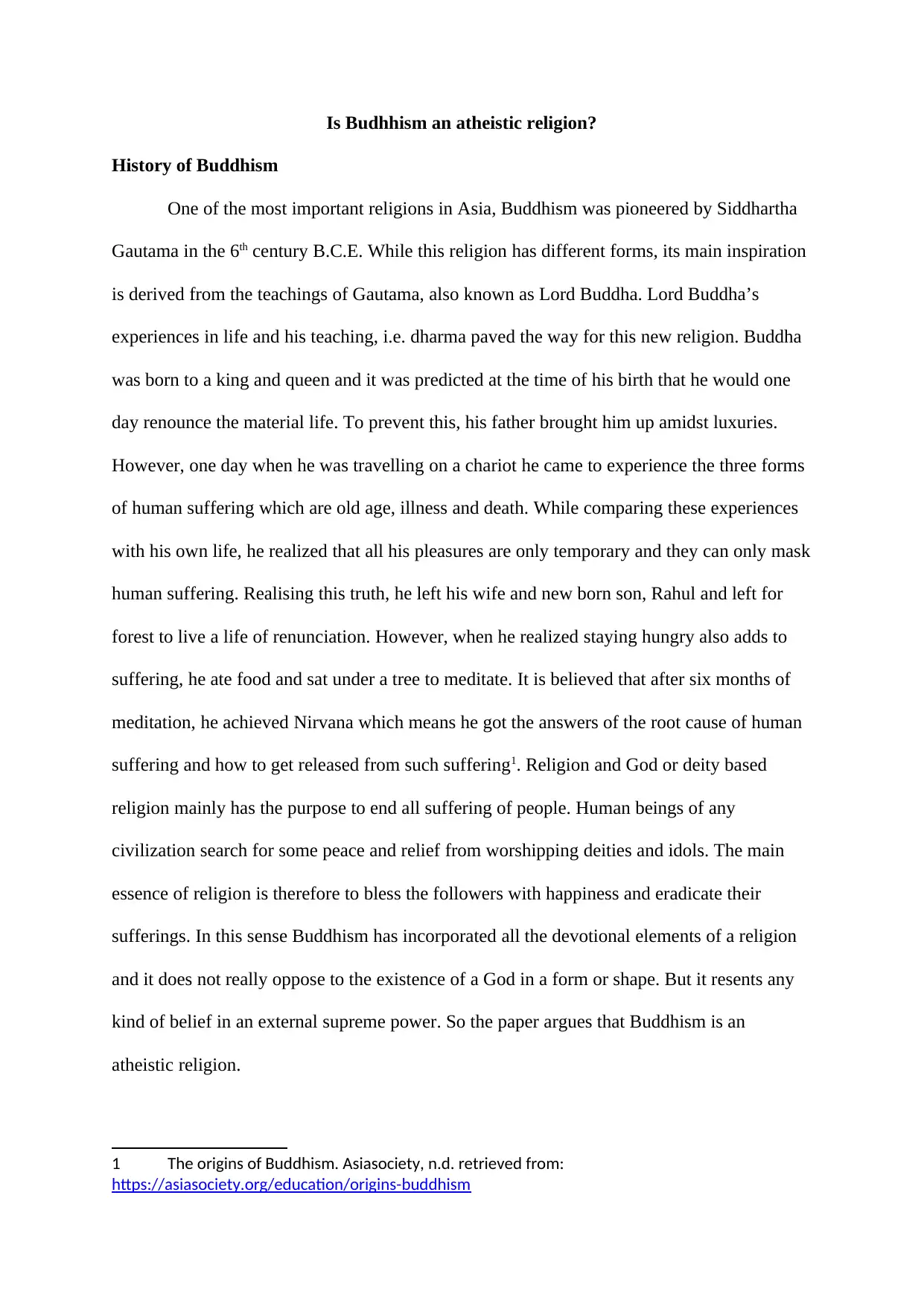
Is Budhhism an atheistic religion?
History of Buddhism
One of the most important religions in Asia, Buddhism was pioneered by Siddhartha
Gautama in the 6th century B.C.E. While this religion has different forms, its main inspiration
is derived from the teachings of Gautama, also known as Lord Buddha. Lord Buddha’s
experiences in life and his teaching, i.e. dharma paved the way for this new religion. Buddha
was born to a king and queen and it was predicted at the time of his birth that he would one
day renounce the material life. To prevent this, his father brought him up amidst luxuries.
However, one day when he was travelling on a chariot he came to experience the three forms
of human suffering which are old age, illness and death. While comparing these experiences
with his own life, he realized that all his pleasures are only temporary and they can only mask
human suffering. Realising this truth, he left his wife and new born son, Rahul and left for
forest to live a life of renunciation. However, when he realized staying hungry also adds to
suffering, he ate food and sat under a tree to meditate. It is believed that after six months of
meditation, he achieved Nirvana which means he got the answers of the root cause of human
suffering and how to get released from such suffering1. Religion and God or deity based
religion mainly has the purpose to end all suffering of people. Human beings of any
civilization search for some peace and relief from worshipping deities and idols. The main
essence of religion is therefore to bless the followers with happiness and eradicate their
sufferings. In this sense Buddhism has incorporated all the devotional elements of a religion
and it does not really oppose to the existence of a God in a form or shape. But it resents any
kind of belief in an external supreme power. So the paper argues that Buddhism is an
atheistic religion.
1 The origins of Buddhism. Asiasociety, n.d. retrieved from:
https://asiasociety.org/education/origins-buddhism
History of Buddhism
One of the most important religions in Asia, Buddhism was pioneered by Siddhartha
Gautama in the 6th century B.C.E. While this religion has different forms, its main inspiration
is derived from the teachings of Gautama, also known as Lord Buddha. Lord Buddha’s
experiences in life and his teaching, i.e. dharma paved the way for this new religion. Buddha
was born to a king and queen and it was predicted at the time of his birth that he would one
day renounce the material life. To prevent this, his father brought him up amidst luxuries.
However, one day when he was travelling on a chariot he came to experience the three forms
of human suffering which are old age, illness and death. While comparing these experiences
with his own life, he realized that all his pleasures are only temporary and they can only mask
human suffering. Realising this truth, he left his wife and new born son, Rahul and left for
forest to live a life of renunciation. However, when he realized staying hungry also adds to
suffering, he ate food and sat under a tree to meditate. It is believed that after six months of
meditation, he achieved Nirvana which means he got the answers of the root cause of human
suffering and how to get released from such suffering1. Religion and God or deity based
religion mainly has the purpose to end all suffering of people. Human beings of any
civilization search for some peace and relief from worshipping deities and idols. The main
essence of religion is therefore to bless the followers with happiness and eradicate their
sufferings. In this sense Buddhism has incorporated all the devotional elements of a religion
and it does not really oppose to the existence of a God in a form or shape. But it resents any
kind of belief in an external supreme power. So the paper argues that Buddhism is an
atheistic religion.
1 The origins of Buddhism. Asiasociety, n.d. retrieved from:
https://asiasociety.org/education/origins-buddhism
Paraphrase This Document
Need a fresh take? Get an instant paraphrase of this document with our AI Paraphraser
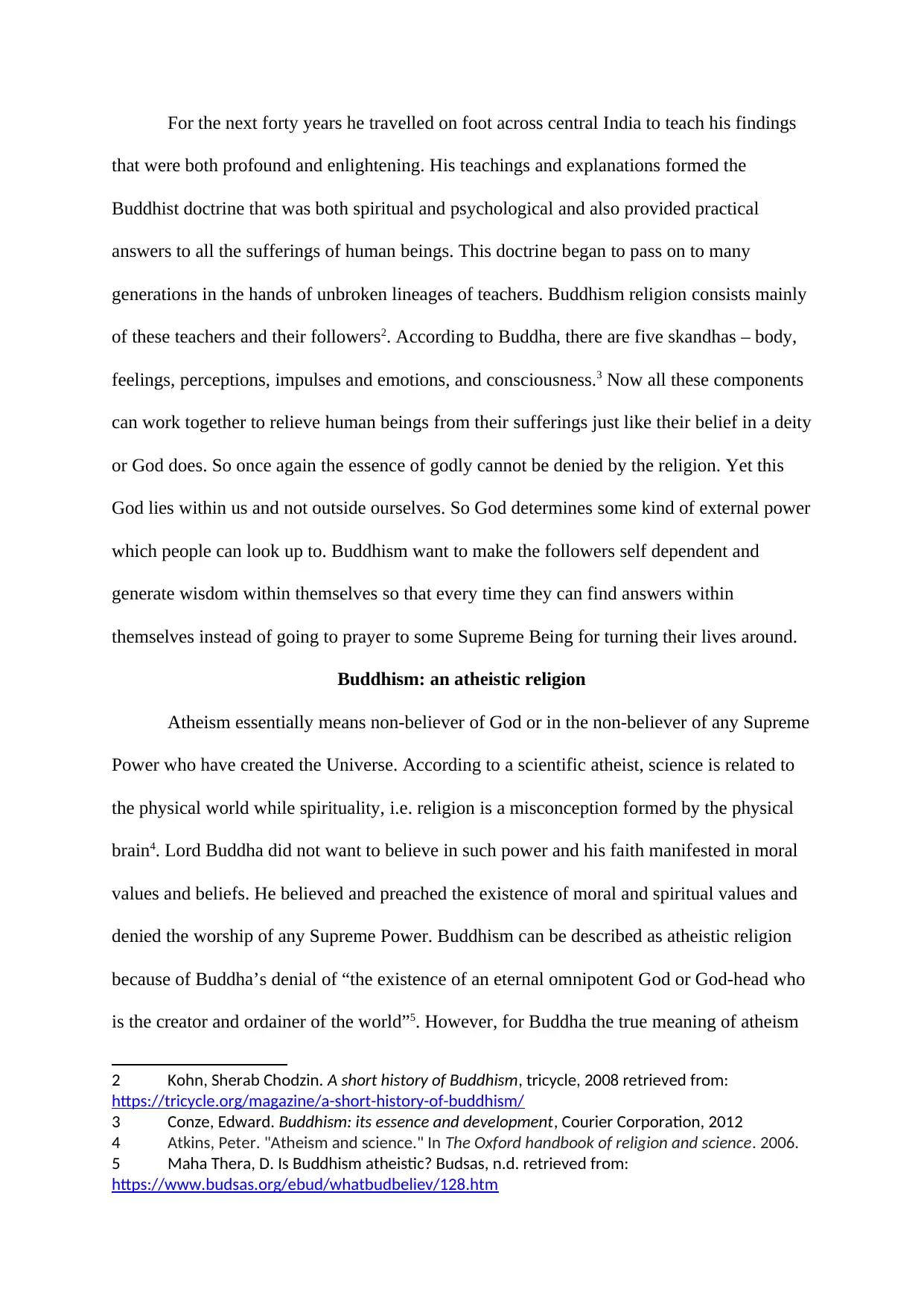
For the next forty years he travelled on foot across central India to teach his findings
that were both profound and enlightening. His teachings and explanations formed the
Buddhist doctrine that was both spiritual and psychological and also provided practical
answers to all the sufferings of human beings. This doctrine began to pass on to many
generations in the hands of unbroken lineages of teachers. Buddhism religion consists mainly
of these teachers and their followers2. According to Buddha, there are five skandhas – body,
feelings, perceptions, impulses and emotions, and consciousness.3 Now all these components
can work together to relieve human beings from their sufferings just like their belief in a deity
or God does. So once again the essence of godly cannot be denied by the religion. Yet this
God lies within us and not outside ourselves. So God determines some kind of external power
which people can look up to. Buddhism want to make the followers self dependent and
generate wisdom within themselves so that every time they can find answers within
themselves instead of going to prayer to some Supreme Being for turning their lives around.
Buddhism: an atheistic religion
Atheism essentially means non-believer of God or in the non-believer of any Supreme
Power who have created the Universe. According to a scientific atheist, science is related to
the physical world while spirituality, i.e. religion is a misconception formed by the physical
brain4. Lord Buddha did not want to believe in such power and his faith manifested in moral
values and beliefs. He believed and preached the existence of moral and spiritual values and
denied the worship of any Supreme Power. Buddhism can be described as atheistic religion
because of Buddha’s denial of “the existence of an eternal omnipotent God or God-head who
is the creator and ordainer of the world”5. However, for Buddha the true meaning of atheism
2 Kohn, Sherab Chodzin. A short history of Buddhism, tricycle, 2008 retrieved from:
https://tricycle.org/magazine/a-short-history-of-buddhism/
3 Conze, Edward. Buddhism: its essence and development, Courier Corporation, 2012
4 Atkins, Peter. "Atheism and science." In The Oxford handbook of religion and science. 2006.
5 Maha Thera, D. Is Buddhism atheistic? Budsas, n.d. retrieved from:
https://www.budsas.org/ebud/whatbudbeliev/128.htm
that were both profound and enlightening. His teachings and explanations formed the
Buddhist doctrine that was both spiritual and psychological and also provided practical
answers to all the sufferings of human beings. This doctrine began to pass on to many
generations in the hands of unbroken lineages of teachers. Buddhism religion consists mainly
of these teachers and their followers2. According to Buddha, there are five skandhas – body,
feelings, perceptions, impulses and emotions, and consciousness.3 Now all these components
can work together to relieve human beings from their sufferings just like their belief in a deity
or God does. So once again the essence of godly cannot be denied by the religion. Yet this
God lies within us and not outside ourselves. So God determines some kind of external power
which people can look up to. Buddhism want to make the followers self dependent and
generate wisdom within themselves so that every time they can find answers within
themselves instead of going to prayer to some Supreme Being for turning their lives around.
Buddhism: an atheistic religion
Atheism essentially means non-believer of God or in the non-believer of any Supreme
Power who have created the Universe. According to a scientific atheist, science is related to
the physical world while spirituality, i.e. religion is a misconception formed by the physical
brain4. Lord Buddha did not want to believe in such power and his faith manifested in moral
values and beliefs. He believed and preached the existence of moral and spiritual values and
denied the worship of any Supreme Power. Buddhism can be described as atheistic religion
because of Buddha’s denial of “the existence of an eternal omnipotent God or God-head who
is the creator and ordainer of the world”5. However, for Buddha the true meaning of atheism
2 Kohn, Sherab Chodzin. A short history of Buddhism, tricycle, 2008 retrieved from:
https://tricycle.org/magazine/a-short-history-of-buddhism/
3 Conze, Edward. Buddhism: its essence and development, Courier Corporation, 2012
4 Atkins, Peter. "Atheism and science." In The Oxford handbook of religion and science. 2006.
5 Maha Thera, D. Is Buddhism atheistic? Budsas, n.d. retrieved from:
https://www.budsas.org/ebud/whatbudbeliev/128.htm
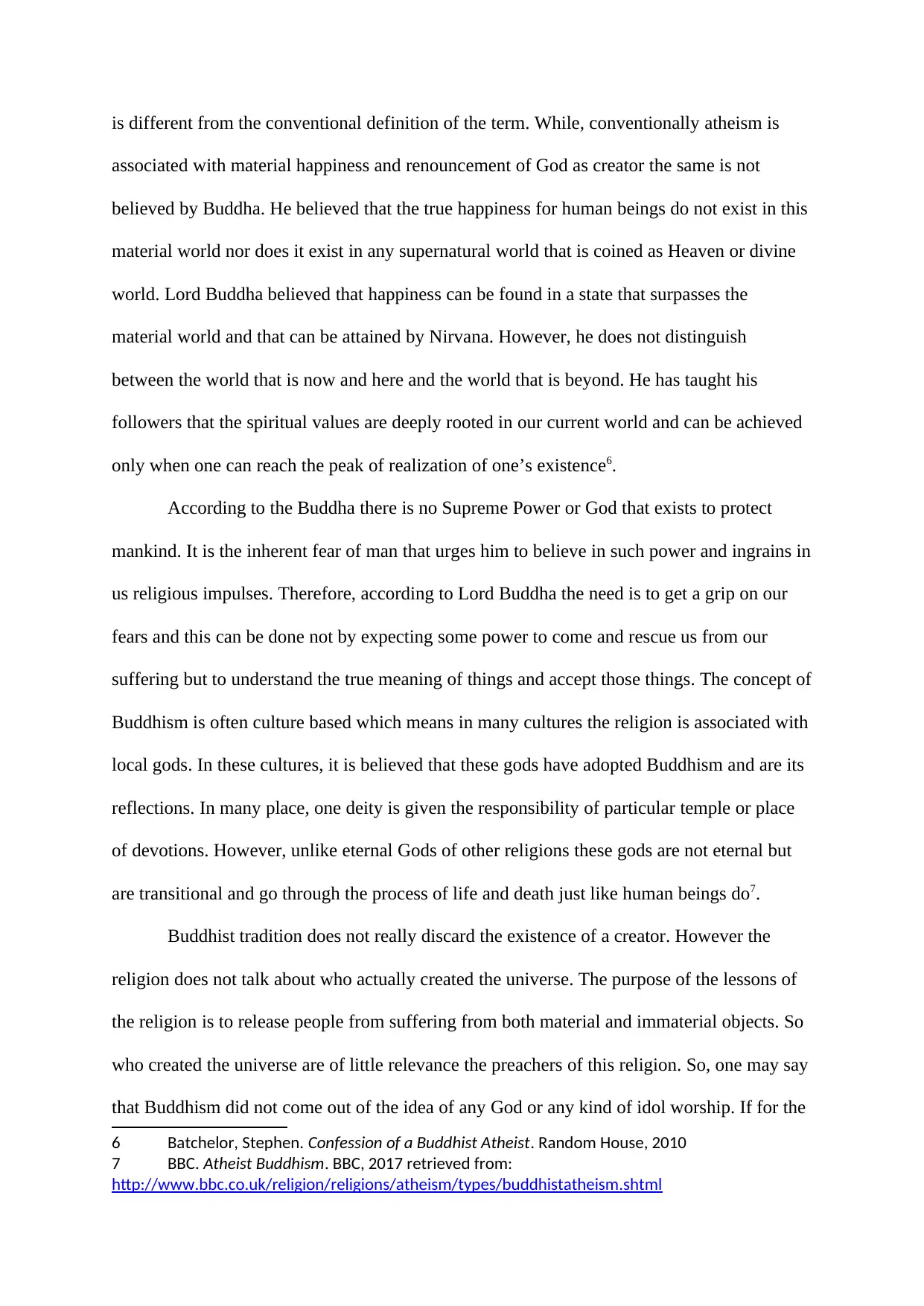
is different from the conventional definition of the term. While, conventionally atheism is
associated with material happiness and renouncement of God as creator the same is not
believed by Buddha. He believed that the true happiness for human beings do not exist in this
material world nor does it exist in any supernatural world that is coined as Heaven or divine
world. Lord Buddha believed that happiness can be found in a state that surpasses the
material world and that can be attained by Nirvana. However, he does not distinguish
between the world that is now and here and the world that is beyond. He has taught his
followers that the spiritual values are deeply rooted in our current world and can be achieved
only when one can reach the peak of realization of one’s existence6.
According to the Buddha there is no Supreme Power or God that exists to protect
mankind. It is the inherent fear of man that urges him to believe in such power and ingrains in
us religious impulses. Therefore, according to Lord Buddha the need is to get a grip on our
fears and this can be done not by expecting some power to come and rescue us from our
suffering but to understand the true meaning of things and accept those things. The concept of
Buddhism is often culture based which means in many cultures the religion is associated with
local gods. In these cultures, it is believed that these gods have adopted Buddhism and are its
reflections. In many place, one deity is given the responsibility of particular temple or place
of devotions. However, unlike eternal Gods of other religions these gods are not eternal but
are transitional and go through the process of life and death just like human beings do7.
Buddhist tradition does not really discard the existence of a creator. However the
religion does not talk about who actually created the universe. The purpose of the lessons of
the religion is to release people from suffering from both material and immaterial objects. So
who created the universe are of little relevance the preachers of this religion. So, one may say
that Buddhism did not come out of the idea of any God or any kind of idol worship. If for the
6 Batchelor, Stephen. Confession of a Buddhist Atheist. Random House, 2010
7 BBC. Atheist Buddhism. BBC, 2017 retrieved from:
http://www.bbc.co.uk/religion/religions/atheism/types/buddhistatheism.shtml
associated with material happiness and renouncement of God as creator the same is not
believed by Buddha. He believed that the true happiness for human beings do not exist in this
material world nor does it exist in any supernatural world that is coined as Heaven or divine
world. Lord Buddha believed that happiness can be found in a state that surpasses the
material world and that can be attained by Nirvana. However, he does not distinguish
between the world that is now and here and the world that is beyond. He has taught his
followers that the spiritual values are deeply rooted in our current world and can be achieved
only when one can reach the peak of realization of one’s existence6.
According to the Buddha there is no Supreme Power or God that exists to protect
mankind. It is the inherent fear of man that urges him to believe in such power and ingrains in
us religious impulses. Therefore, according to Lord Buddha the need is to get a grip on our
fears and this can be done not by expecting some power to come and rescue us from our
suffering but to understand the true meaning of things and accept those things. The concept of
Buddhism is often culture based which means in many cultures the religion is associated with
local gods. In these cultures, it is believed that these gods have adopted Buddhism and are its
reflections. In many place, one deity is given the responsibility of particular temple or place
of devotions. However, unlike eternal Gods of other religions these gods are not eternal but
are transitional and go through the process of life and death just like human beings do7.
Buddhist tradition does not really discard the existence of a creator. However the
religion does not talk about who actually created the universe. The purpose of the lessons of
the religion is to release people from suffering from both material and immaterial objects. So
who created the universe are of little relevance the preachers of this religion. So, one may say
that Buddhism did not come out of the idea of any God or any kind of idol worship. If for the
6 Batchelor, Stephen. Confession of a Buddhist Atheist. Random House, 2010
7 BBC. Atheist Buddhism. BBC, 2017 retrieved from:
http://www.bbc.co.uk/religion/religions/atheism/types/buddhistatheism.shtml
⊘ This is a preview!⊘
Do you want full access?
Subscribe today to unlock all pages.

Trusted by 1+ million students worldwide
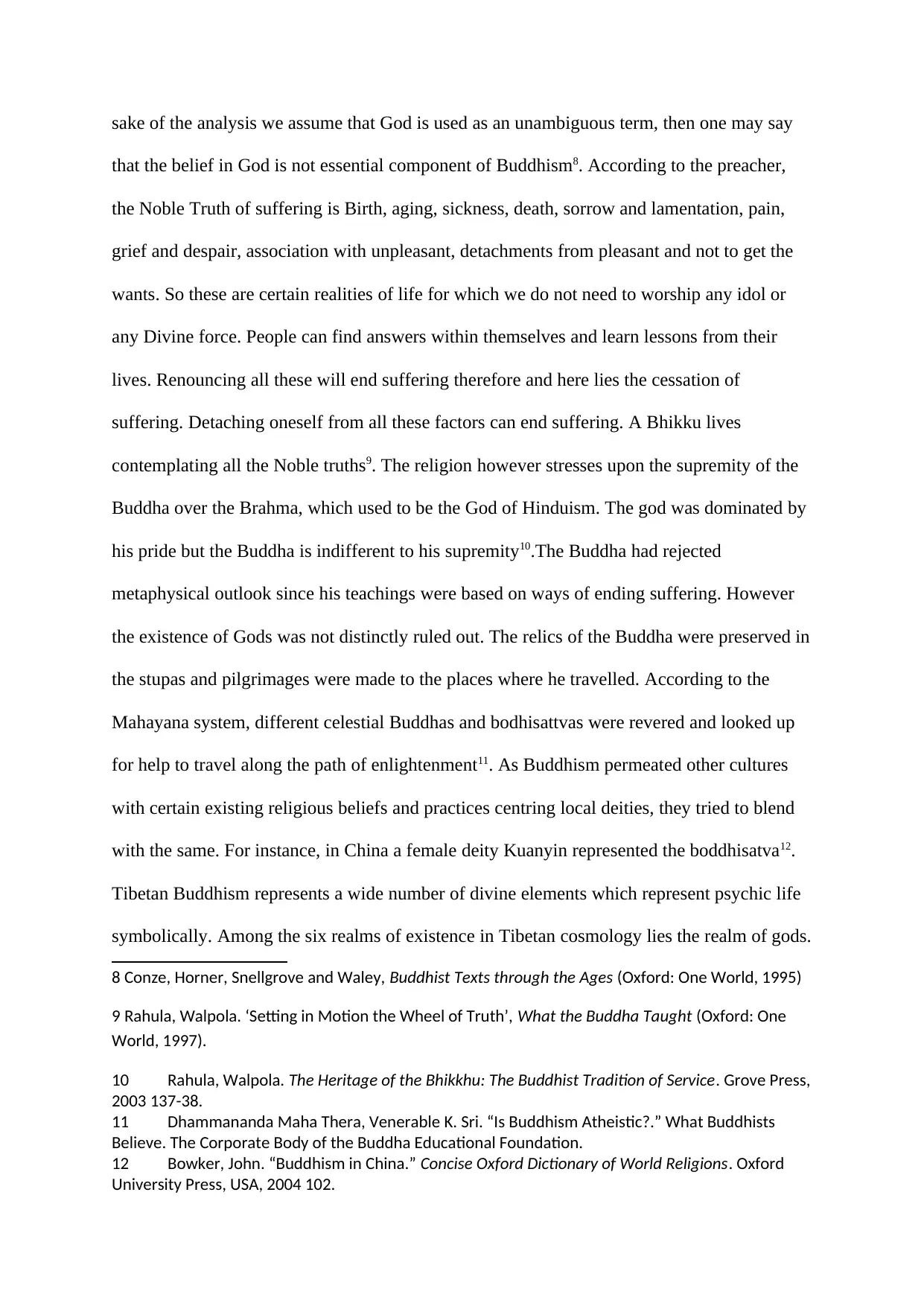
sake of the analysis we assume that God is used as an unambiguous term, then one may say
that the belief in God is not essential component of Buddhism8. According to the preacher,
the Noble Truth of suffering is Birth, aging, sickness, death, sorrow and lamentation, pain,
grief and despair, association with unpleasant, detachments from pleasant and not to get the
wants. So these are certain realities of life for which we do not need to worship any idol or
any Divine force. People can find answers within themselves and learn lessons from their
lives. Renouncing all these will end suffering therefore and here lies the cessation of
suffering. Detaching oneself from all these factors can end suffering. A Bhikku lives
contemplating all the Noble truths9. The religion however stresses upon the supremity of the
Buddha over the Brahma, which used to be the God of Hinduism. The god was dominated by
his pride but the Buddha is indifferent to his supremity10.The Buddha had rejected
metaphysical outlook since his teachings were based on ways of ending suffering. However
the existence of Gods was not distinctly ruled out. The relics of the Buddha were preserved in
the stupas and pilgrimages were made to the places where he travelled. According to the
Mahayana system, different celestial Buddhas and bodhisattvas were revered and looked up
for help to travel along the path of enlightenment11. As Buddhism permeated other cultures
with certain existing religious beliefs and practices centring local deities, they tried to blend
with the same. For instance, in China a female deity Kuanyin represented the boddhisatva12.
Tibetan Buddhism represents a wide number of divine elements which represent psychic life
symbolically. Among the six realms of existence in Tibetan cosmology lies the realm of gods.
8 Conze, Horner, Snellgrove and Waley, Buddhist Texts through the Ages (Oxford: One World, 1995)
9 Rahula, Walpola. ‘Setting in Motion the Wheel of Truth’, What the Buddha Taught (Oxford: One
World, 1997).
10 Rahula, Walpola. The Heritage of the Bhikkhu: The Buddhist Tradition of Service. Grove Press,
2003 137-38.
11 Dhammananda Maha Thera, Venerable K. Sri. “Is Buddhism Atheistic?.” What Buddhists
Believe. The Corporate Body of the Buddha Educational Foundation.
12 Bowker, John. “Buddhism in China.” Concise Oxford Dictionary of World Religions. Oxford
University Press, USA, 2004 102.
that the belief in God is not essential component of Buddhism8. According to the preacher,
the Noble Truth of suffering is Birth, aging, sickness, death, sorrow and lamentation, pain,
grief and despair, association with unpleasant, detachments from pleasant and not to get the
wants. So these are certain realities of life for which we do not need to worship any idol or
any Divine force. People can find answers within themselves and learn lessons from their
lives. Renouncing all these will end suffering therefore and here lies the cessation of
suffering. Detaching oneself from all these factors can end suffering. A Bhikku lives
contemplating all the Noble truths9. The religion however stresses upon the supremity of the
Buddha over the Brahma, which used to be the God of Hinduism. The god was dominated by
his pride but the Buddha is indifferent to his supremity10.The Buddha had rejected
metaphysical outlook since his teachings were based on ways of ending suffering. However
the existence of Gods was not distinctly ruled out. The relics of the Buddha were preserved in
the stupas and pilgrimages were made to the places where he travelled. According to the
Mahayana system, different celestial Buddhas and bodhisattvas were revered and looked up
for help to travel along the path of enlightenment11. As Buddhism permeated other cultures
with certain existing religious beliefs and practices centring local deities, they tried to blend
with the same. For instance, in China a female deity Kuanyin represented the boddhisatva12.
Tibetan Buddhism represents a wide number of divine elements which represent psychic life
symbolically. Among the six realms of existence in Tibetan cosmology lies the realm of gods.
8 Conze, Horner, Snellgrove and Waley, Buddhist Texts through the Ages (Oxford: One World, 1995)
9 Rahula, Walpola. ‘Setting in Motion the Wheel of Truth’, What the Buddha Taught (Oxford: One
World, 1997).
10 Rahula, Walpola. The Heritage of the Bhikkhu: The Buddhist Tradition of Service. Grove Press,
2003 137-38.
11 Dhammananda Maha Thera, Venerable K. Sri. “Is Buddhism Atheistic?.” What Buddhists
Believe. The Corporate Body of the Buddha Educational Foundation.
12 Bowker, John. “Buddhism in China.” Concise Oxford Dictionary of World Religions. Oxford
University Press, USA, 2004 102.
Paraphrase This Document
Need a fresh take? Get an instant paraphrase of this document with our AI Paraphraser
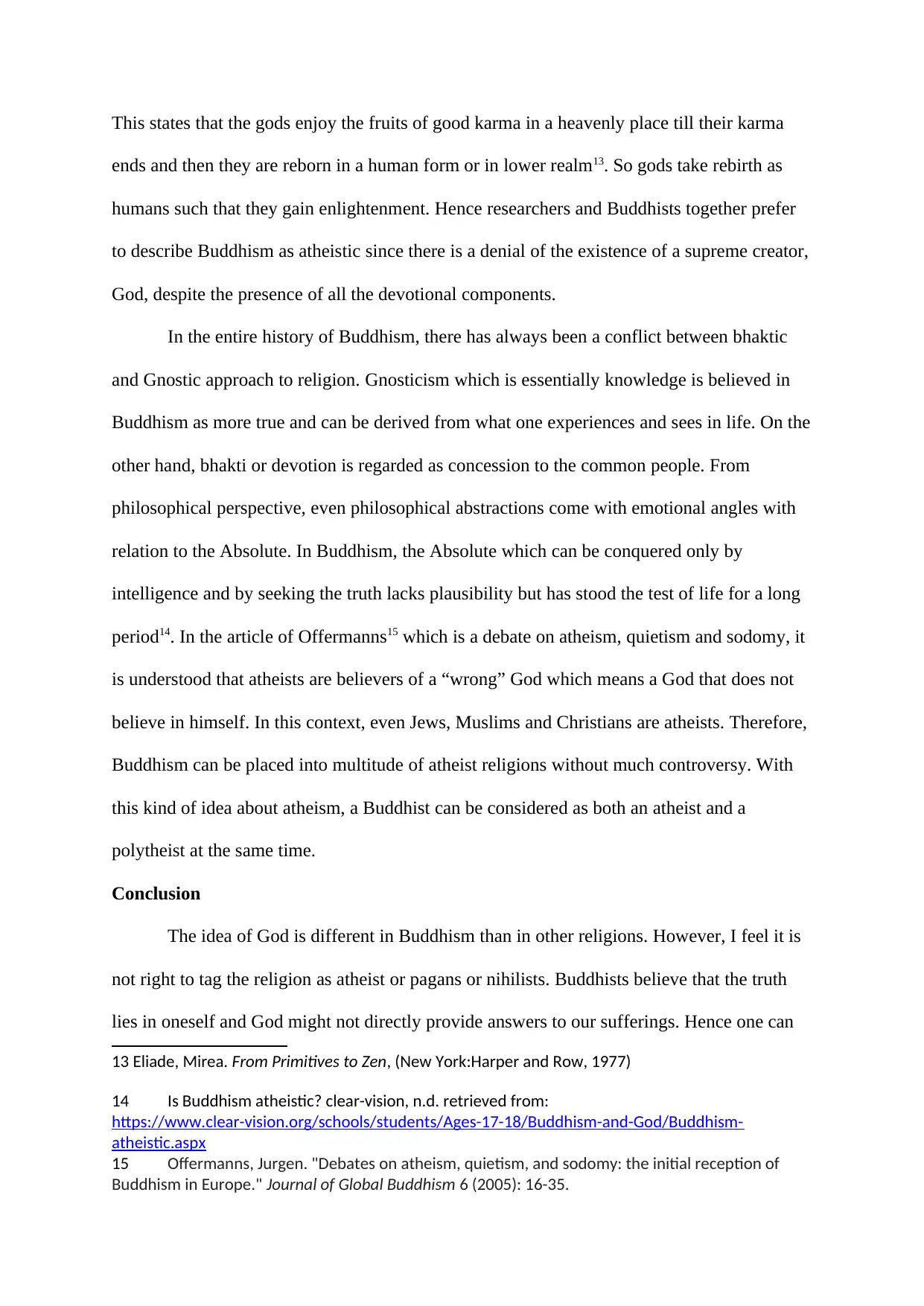
This states that the gods enjoy the fruits of good karma in a heavenly place till their karma
ends and then they are reborn in a human form or in lower realm13. So gods take rebirth as
humans such that they gain enlightenment. Hence researchers and Buddhists together prefer
to describe Buddhism as atheistic since there is a denial of the existence of a supreme creator,
God, despite the presence of all the devotional components.
In the entire history of Buddhism, there has always been a conflict between bhaktic
and Gnostic approach to religion. Gnosticism which is essentially knowledge is believed in
Buddhism as more true and can be derived from what one experiences and sees in life. On the
other hand, bhakti or devotion is regarded as concession to the common people. From
philosophical perspective, even philosophical abstractions come with emotional angles with
relation to the Absolute. In Buddhism, the Absolute which can be conquered only by
intelligence and by seeking the truth lacks plausibility but has stood the test of life for a long
period14. In the article of Offermanns15 which is a debate on atheism, quietism and sodomy, it
is understood that atheists are believers of a “wrong” God which means a God that does not
believe in himself. In this context, even Jews, Muslims and Christians are atheists. Therefore,
Buddhism can be placed into multitude of atheist religions without much controversy. With
this kind of idea about atheism, a Buddhist can be considered as both an atheist and a
polytheist at the same time.
Conclusion
The idea of God is different in Buddhism than in other religions. However, I feel it is
not right to tag the religion as atheist or pagans or nihilists. Buddhists believe that the truth
lies in oneself and God might not directly provide answers to our sufferings. Hence one can
13 Eliade, Mirea. From Primitives to Zen, (New York:Harper and Row, 1977)
14 Is Buddhism atheistic? clear-vision, n.d. retrieved from:
https://www.clear-vision.org/schools/students/Ages-17-18/Buddhism-and-God/Buddhism-
atheistic.aspx
15 Offermanns, Jurgen. "Debates on atheism, quietism, and sodomy: the initial reception of
Buddhism in Europe." Journal of Global Buddhism 6 (2005): 16-35.
ends and then they are reborn in a human form or in lower realm13. So gods take rebirth as
humans such that they gain enlightenment. Hence researchers and Buddhists together prefer
to describe Buddhism as atheistic since there is a denial of the existence of a supreme creator,
God, despite the presence of all the devotional components.
In the entire history of Buddhism, there has always been a conflict between bhaktic
and Gnostic approach to religion. Gnosticism which is essentially knowledge is believed in
Buddhism as more true and can be derived from what one experiences and sees in life. On the
other hand, bhakti or devotion is regarded as concession to the common people. From
philosophical perspective, even philosophical abstractions come with emotional angles with
relation to the Absolute. In Buddhism, the Absolute which can be conquered only by
intelligence and by seeking the truth lacks plausibility but has stood the test of life for a long
period14. In the article of Offermanns15 which is a debate on atheism, quietism and sodomy, it
is understood that atheists are believers of a “wrong” God which means a God that does not
believe in himself. In this context, even Jews, Muslims and Christians are atheists. Therefore,
Buddhism can be placed into multitude of atheist religions without much controversy. With
this kind of idea about atheism, a Buddhist can be considered as both an atheist and a
polytheist at the same time.
Conclusion
The idea of God is different in Buddhism than in other religions. However, I feel it is
not right to tag the religion as atheist or pagans or nihilists. Buddhists believe that the truth
lies in oneself and God might not directly provide answers to our sufferings. Hence one can
13 Eliade, Mirea. From Primitives to Zen, (New York:Harper and Row, 1977)
14 Is Buddhism atheistic? clear-vision, n.d. retrieved from:
https://www.clear-vision.org/schools/students/Ages-17-18/Buddhism-and-God/Buddhism-
atheistic.aspx
15 Offermanns, Jurgen. "Debates on atheism, quietism, and sodomy: the initial reception of
Buddhism in Europe." Journal of Global Buddhism 6 (2005): 16-35.

call it an atheistic religion because although the religion has the devotional elements and the
idea of finding God within oneself it does not propose the existence of any external supreme
force of guidance. The answers lie within the human beings and the God also resides within
ourselves if we know how to worship our soul by leading the Noble Path. The God
worshipped as deities cannot reign supreme because ultimately one has to help himself. So
Buddhism can unequivocally be called an atheistic religion.
idea of finding God within oneself it does not propose the existence of any external supreme
force of guidance. The answers lie within the human beings and the God also resides within
ourselves if we know how to worship our soul by leading the Noble Path. The God
worshipped as deities cannot reign supreme because ultimately one has to help himself. So
Buddhism can unequivocally be called an atheistic religion.
⊘ This is a preview!⊘
Do you want full access?
Subscribe today to unlock all pages.

Trusted by 1+ million students worldwide
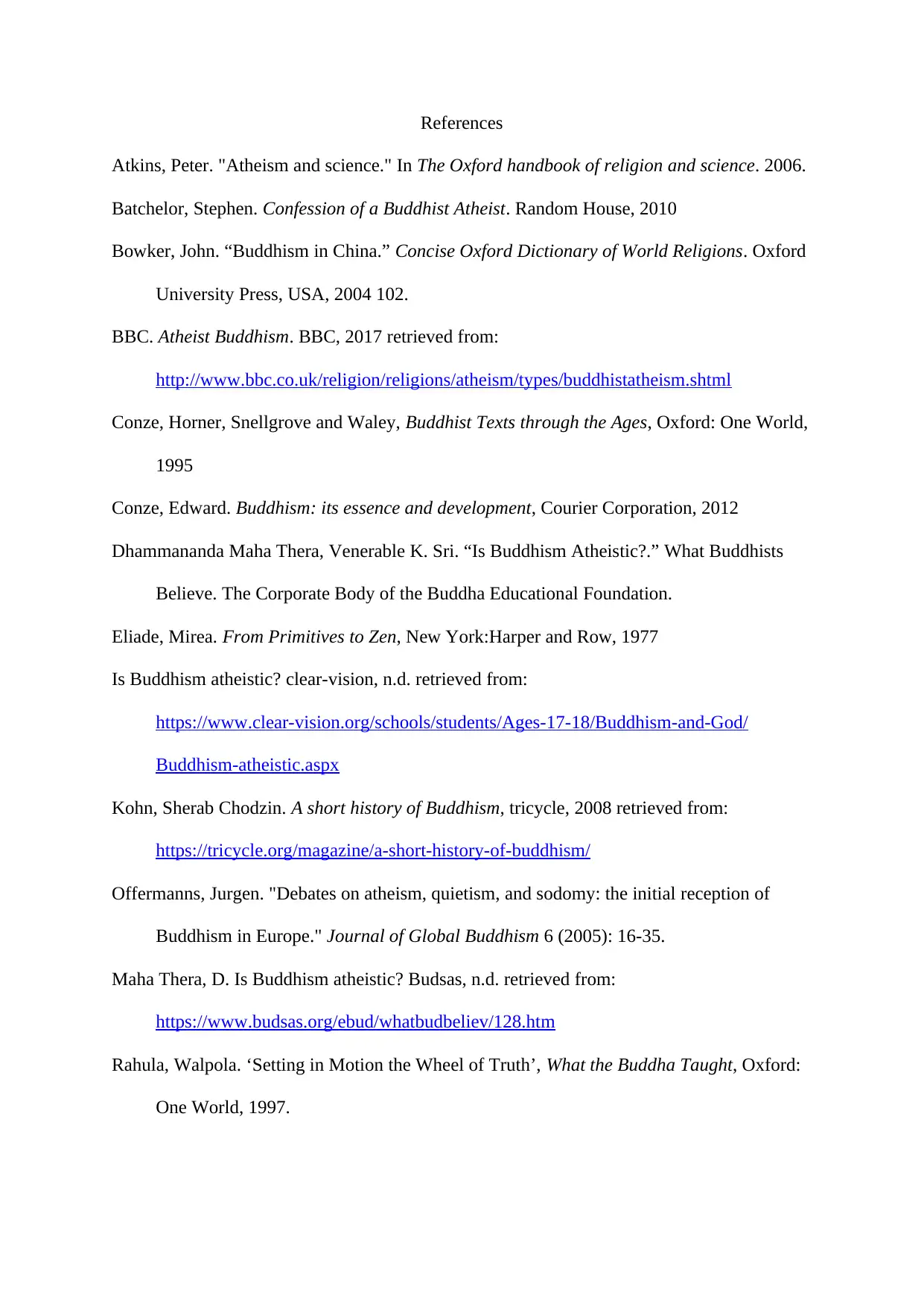
References
Atkins, Peter. "Atheism and science." In The Oxford handbook of religion and science. 2006.
Batchelor, Stephen. Confession of a Buddhist Atheist. Random House, 2010
Bowker, John. “Buddhism in China.” Concise Oxford Dictionary of World Religions. Oxford
University Press, USA, 2004 102.
BBC. Atheist Buddhism. BBC, 2017 retrieved from:
http://www.bbc.co.uk/religion/religions/atheism/types/buddhistatheism.shtml
Conze, Horner, Snellgrove and Waley, Buddhist Texts through the Ages, Oxford: One World,
1995
Conze, Edward. Buddhism: its essence and development, Courier Corporation, 2012
Dhammananda Maha Thera, Venerable K. Sri. “Is Buddhism Atheistic?.” What Buddhists
Believe. The Corporate Body of the Buddha Educational Foundation.
Eliade, Mirea. From Primitives to Zen, New York:Harper and Row, 1977
Is Buddhism atheistic? clear-vision, n.d. retrieved from:
https://www.clear-vision.org/schools/students/Ages-17-18/Buddhism-and-God/
Buddhism-atheistic.aspx
Kohn, Sherab Chodzin. A short history of Buddhism, tricycle, 2008 retrieved from:
https://tricycle.org/magazine/a-short-history-of-buddhism/
Offermanns, Jurgen. "Debates on atheism, quietism, and sodomy: the initial reception of
Buddhism in Europe." Journal of Global Buddhism 6 (2005): 16-35.
Maha Thera, D. Is Buddhism atheistic? Budsas, n.d. retrieved from:
https://www.budsas.org/ebud/whatbudbeliev/128.htm
Rahula, Walpola. ‘Setting in Motion the Wheel of Truth’, What the Buddha Taught, Oxford:
One World, 1997.
Atkins, Peter. "Atheism and science." In The Oxford handbook of religion and science. 2006.
Batchelor, Stephen. Confession of a Buddhist Atheist. Random House, 2010
Bowker, John. “Buddhism in China.” Concise Oxford Dictionary of World Religions. Oxford
University Press, USA, 2004 102.
BBC. Atheist Buddhism. BBC, 2017 retrieved from:
http://www.bbc.co.uk/religion/religions/atheism/types/buddhistatheism.shtml
Conze, Horner, Snellgrove and Waley, Buddhist Texts through the Ages, Oxford: One World,
1995
Conze, Edward. Buddhism: its essence and development, Courier Corporation, 2012
Dhammananda Maha Thera, Venerable K. Sri. “Is Buddhism Atheistic?.” What Buddhists
Believe. The Corporate Body of the Buddha Educational Foundation.
Eliade, Mirea. From Primitives to Zen, New York:Harper and Row, 1977
Is Buddhism atheistic? clear-vision, n.d. retrieved from:
https://www.clear-vision.org/schools/students/Ages-17-18/Buddhism-and-God/
Buddhism-atheistic.aspx
Kohn, Sherab Chodzin. A short history of Buddhism, tricycle, 2008 retrieved from:
https://tricycle.org/magazine/a-short-history-of-buddhism/
Offermanns, Jurgen. "Debates on atheism, quietism, and sodomy: the initial reception of
Buddhism in Europe." Journal of Global Buddhism 6 (2005): 16-35.
Maha Thera, D. Is Buddhism atheistic? Budsas, n.d. retrieved from:
https://www.budsas.org/ebud/whatbudbeliev/128.htm
Rahula, Walpola. ‘Setting in Motion the Wheel of Truth’, What the Buddha Taught, Oxford:
One World, 1997.
Paraphrase This Document
Need a fresh take? Get an instant paraphrase of this document with our AI Paraphraser

Rahula, Walpola. The Heritage of the Bhikkhu: The Buddhist Tradition of Service. Grove
Press, 2003 137-38.
The origins of Buddhism. Asiasociety, n.d. retrieved from:
https://asiasociety.org/education/origins-buddhism
Press, 2003 137-38.
The origins of Buddhism. Asiasociety, n.d. retrieved from:
https://asiasociety.org/education/origins-buddhism
1 out of 8
Related Documents
Your All-in-One AI-Powered Toolkit for Academic Success.
+13062052269
info@desklib.com
Available 24*7 on WhatsApp / Email
![[object Object]](/_next/static/media/star-bottom.7253800d.svg)
Unlock your academic potential
Copyright © 2020–2026 A2Z Services. All Rights Reserved. Developed and managed by ZUCOL.





